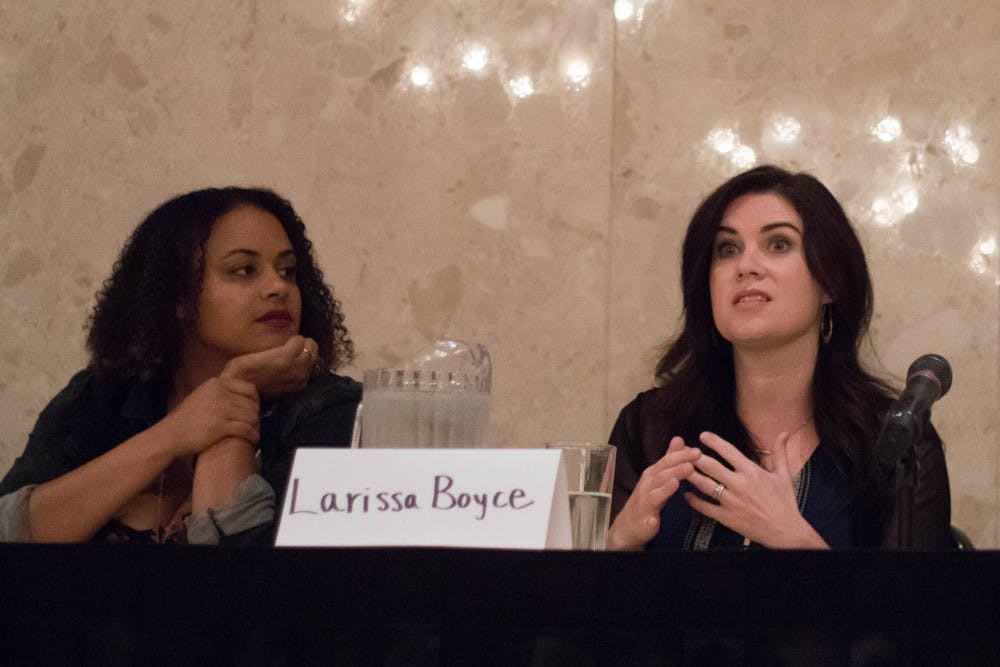In light of more than 400 women and girls coming forward as survivors of ex-MSU doctor Larry Nassar's sexual abuse, a forum on child sexual abuse and identifying "acquaintance" or "nice guy" sexual offenders was held on MSU's campus in the Union Ballroom on Friday.
The forum aimed to educate the community about these kinds of perpetrators, like Nassar, and what the warning signs of child sexual abuse are.
"People can talk about this. People need to talk about sexual abuse, because it's not going to stop," Nassar survivor Larissa Boyce said. "Talk about it, and educate yourself about it."
The panel included Nassar survivor Larissa Boyce, retired FBI Supervisory Special Agent and Expert Witness Jim Clemente, former Federal Prosecutor Francey Hakes, Medical Malpractice Lawyer David Mittleman and Executive Director of the Firecracker Foundation Tashmica Torok.
The forum was moderated by Executive Editor of the Lansing State Journal Stephanie Angel, who presented discussion questions and took questions in the form of anonymously-written index cards from the crowd. The forum began with a discussion on the kinds of "grooming" techniques "nice guy" perpetrators use.
"It is not 'stranger danger' we have to watch out for,” Hakes, who has prosecuted multiple child sexual abuse cases, said. “Children are most at risk with people inside their circles of trust who are master manipulators.”
At the forum, Boyce spoke out about how she was groomed by Nassar. She said he would act like he wasn't just her doctor, but her friend.
"I did come forward, and I was told by two adults that I trusted that what was happening to me was legitimate medical treatment," Boyce said. "Even though I felt uncomfortable, in order to survive through it, I had to convince myself that there was something wrong with me and that I had to be okay with what Nassar was doing."
Boyce said she raised concerns about Nassar to the university in 1997.
She said she told her coach, former MSU gymnastics coach Kathie Klages, who has recently been arraigned on two charges of lying about her knowledge of Nassar's abuse. Klages allegedly told her not to file a report.
"Ultimately, I was brainwashed for 20 years," Boyce said.
Mittleman, an attorney who represents dozens of survivors, said he found it strange that a lot of the girls he spoke to, some as young as 14, called Nassar by his first name.
"He was developing this sense of a comfort zone, providing trinkets from the Olympics to all these young girls who were aspiring to be the Kerri Strug of the 1996 Summer Olympics," Mittleman said.
Boyce said she and other gymnasts looked up to Nassar and loved him.
"It's kind of like this battle in your mind. You don't want to hurt this guy because he's a good guy, that's what everyone is telling you, he's a good guy. And you don't want to question that," Boyce said. "Change is going to happen when we continue to educate ourselves, our kids ... that adults should not have a friendship with children."
Panelist Tashmica Torok also spoke about her child sexual abuse. She was victimized by her father from ages six to eight.
“Ultimately, children want love and attention," Torok said. "They don’t have any context to understand that this is unhealthy."
Near the end of the forum, panelists answered a few questions that were submitted by members in the crowd. One anonymous person asked what the best way to be supportive of survivors of sexual assault was.
Support student media!
Please consider donating to The State News and help fund the future of journalism.
Volunteering at child advocacy centers and not being afraid to talk about child sexual abuse were some of the things the panel brought up.
Boyce said when she came out with her sexual abuse story, some people stopped talking to her. Torok said many people assumed that because she is a survivor, she is damaged or ruined, even though that's not always the case.
“There’s always someone who wants to fix you,” Torok said.
The final question addressed at the panel was how parents should support a child who is a victim of sexual abuse.
Boyce spoke about the importance of listening, being aware and not denying their stories. Another panelist, Clemente, provided some resources for survivors.
All of the panelists spoke about the importance of educating children and the community on this topic, and said that was the point of holding this forum.
"Choose to prioritize children," Torok said. "We make choices every day as institutions, as agencies, as communities, as parents, as friends, as aunties — we make choices every day that impact children and we don't necessarily factor them in when we need to. I think in some ways, children are an afterthought ... and that really needs to change."
Discussion
Share and discuss “Survivor Larissa Boyce and other MSU panelists address child sexual abuse” on social media.







